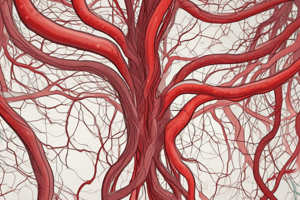Podcast
Questions and Answers
Which blood vessels have the thickest muscular walls?
Which blood vessels have the thickest muscular walls?
- Capillaries
- Veins
- Arterioles
- Arteries (correct)
Which blood vessels are responsible for controlling blood flow?
Which blood vessels are responsible for controlling blood flow?
- Arteries
- Capillaries
- Arterioles (correct)
- Venules
Which blood vessels act as major reservoirs for extra blood?
Which blood vessels act as major reservoirs for extra blood?
- Arterioles
- Capillaries
- Arteries
- Veins (correct)
Which blood vessels have the thinnest walls?
Which blood vessels have the thinnest walls?
Which blood vessels have a low pressure?
Which blood vessels have a low pressure?
Which blood vessels are responsible for collecting blood from capillaries?
Which blood vessels are responsible for collecting blood from capillaries?
Which blood vessels have the thickest muscular walls?
Which blood vessels have the thickest muscular walls?
Which blood vessels are responsible for controlling blood flow?
Which blood vessels are responsible for controlling blood flow?
Which blood vessels act as major reservoirs for extra blood?
Which blood vessels act as major reservoirs for extra blood?
Which blood vessels carry blood back to the heart?
Which blood vessels carry blood back to the heart?
What is the main function of veins?
What is the main function of veins?
Which blood vessels have valves to prevent backflow of blood?
Which blood vessels have valves to prevent backflow of blood?
Which type of blood vessels carry oxygenated blood away from the heart?
Which type of blood vessels carry oxygenated blood away from the heart?
What is the main function of arteries?
What is the main function of arteries?
Flashcards are hidden until you start studying
Study Notes
Blood Vessel Characteristics
- Arteries have the thickest muscular walls, which helps to maintain blood pressure.
- Arterioles are responsible for controlling blood flow, as they can constrict or dilate to regulate blood flow to specific areas of the body.
- Veins act as major reservoirs for extra blood, storing approximately 50-60% of the total blood volume.
Blood Vessel Structure
- Capillaries have the thinnest walls, consisting of a single layer of endothelial cells, allowing for efficient exchange of oxygen and nutrients.
- Veins have low pressure, which is aided by the presence of one-way valves that prevent backflow.
Blood Vessel Function
- Venules are responsible for collecting blood from capillaries, converging to form larger veins.
- Veins carry blood back to the heart, with the main function of returning deoxygenated blood.
- Arteries carry oxygenated blood away from the heart, with the main function of distributing oxygen and nutrients to the body.
Additional Features
- Veins have valves to prevent backflow of blood, ensuring that blood flows in one direction.
- The main function of arteries is to distribute oxygenated blood to the body, while the main function of veins is to return deoxygenated blood to the heart.
Studying That Suits You
Use AI to generate personalized quizzes and flashcards to suit your learning preferences.




